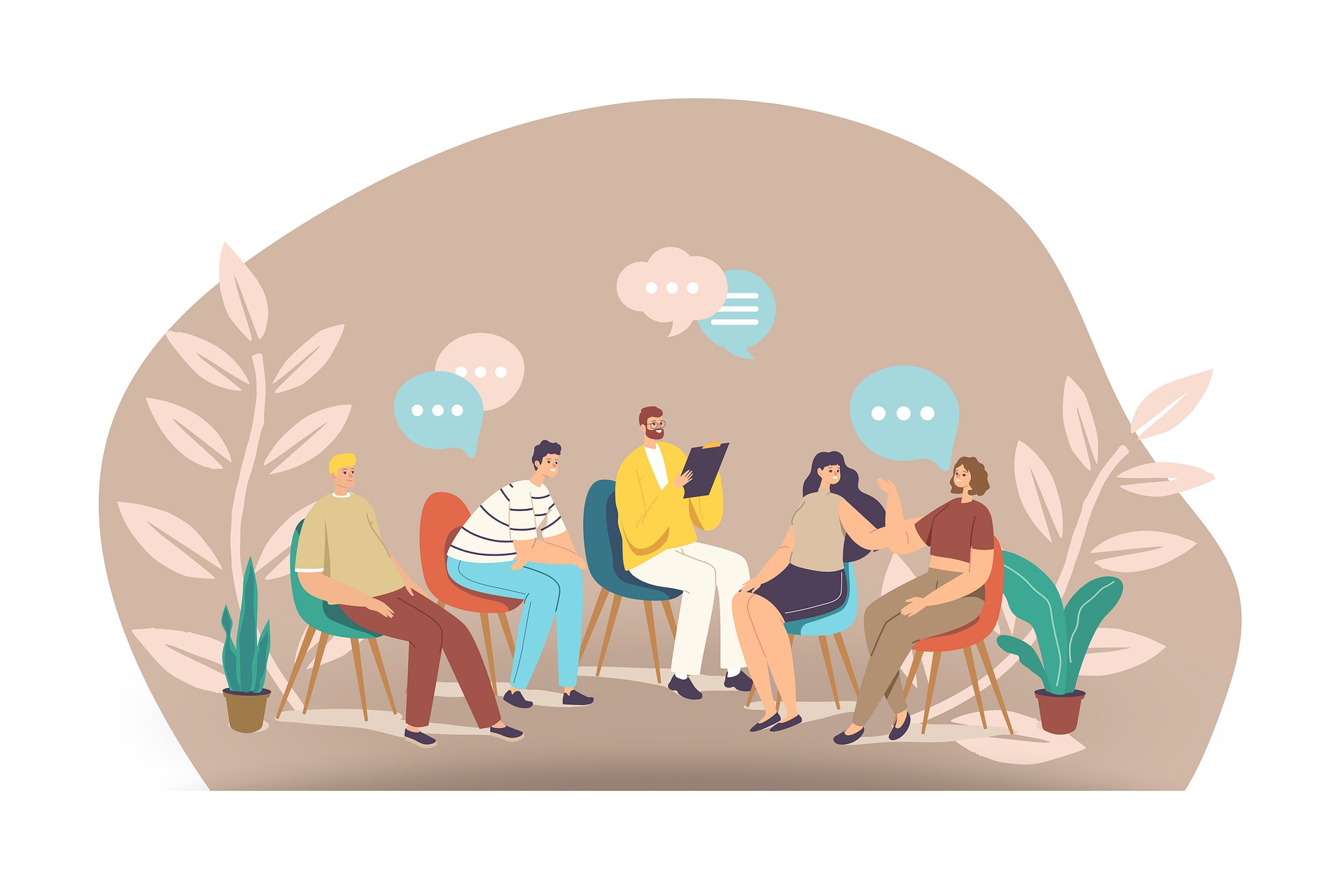
Contact with mental health peers in a non-clinical setting
An opinion from the Belgian Higher Health Council focuses on peer contacts organized by peer helpers in a non-clinical setting. Analysis of the data shows a mostly positive picture, with individuals feeling “heard, seen and understood” by sharing their own experience as a valuable source of support and inspiration.
Peer contact is increasingly used in mental health care. However, there is currently a lack of structural framework and recognition of their added value, both individual and social, in the context of care. Following a call for “mental health” projects and a proposal from the non-profit organization UilenSpiegel, the Higher Health Council (CSS) decided to develop recommendations on this subject ; and more specifically on intentional asymmetric contact in mental health care with people suffering from mental vulnerability outside the institutional and clinical setting.
The opinion is based on a systematic analysis of the scientific literature, a Delphi stakeholder study and, in addition, an analysis of the experience of participants in peer counseling sessions. The scientific literature shows considerable diversity in research on peer contact (different definitions, theoretical frameworks, contents, care contexts, methodologies, types of results, outcome measures, etc.), but despite the heterogeneity and even ambiguities, all studies show direct and indirect positive effects and an absence of negative effects due to peer contact.
The added value lies in contact between people with similar experiences, which facilitates natural recognition and support within a mental health recovery process in general, as well as in specific target groups.
– In the context of peer contact of a reciprocal nature, informal and natural support can occur.
-In the context of formal contact between peers, of a more unidirectional nature, a professional framework is necessary to guarantee the participants a certain quality and to protect the peer helper himself. This framework is linked to peer support worker recovery and also includes elements of education and training in specific skills.

Peer helpers, in addition to advising peers, can fulfill an important signaling function with regard to policies and society. Furthermore, it is essential that their valuable contribution is fully recognized and funded. Currently, scientific studies mainly focus on formal peer contacts within the traditional healthcare system, while the added value of peer contacts outside the healthcare setting remains little examined. Psychosocial effects potentially similar to those obtained in conventional care highlight the need for further research in this area to avoid forcing peers to function within existing care structures
Using the Delphi* method, peer supporters, mental health professionals, patients and their families were interviewed in the French- and Dutch-speaking parts of the country. During three rounds of questions, consensus was reached on 38 of 52 statements regarding the added value of peer contacts and the need to organize professionally. Overall, no proposals were rejected, but participants’ comments highlighted a number of divergent opinions, particularly between the different target groups interviewed. These opinions were analyzed and matched with the remaining declarations which were not
accepted.
The analysis shows that peer support, as a complement to clinical care, can be useful at different stages of the recovery process and provides added value both to the patient and to the peer supporter themselves. As part of this complementary role to conventional health care, resolving lapses and problems with conventional health care providers is by no means the implicit task of peer supporters. The professional organization of peer support requires status based on several specific job descriptions that reflect the diversity of roles within peer support. This status is essential for the recognition of the peer caregiver, for their protection and that of the patient. This status can allow them to be paid according to scales established according to job descriptions. Experience is a prerequisite, and hands-on training can cover different topics. Additional support includes logistical and financial support, as well as integration into support teams, organizations and a professional network.
Analysis of data relating to the experiences of 51 patients within peer groups shows a predominantly positive picture, with individuals feeling ‘heard, seen and understood’ by sharing their own experience as a valuable source of support and insight. ‘inspiration. They indicated that in addition to their personal experience, their professional skills could contribute to effective counseling. Online peer support was seen as widely accessible, removing the barrier of travel, but with the limitation of low visibility of body language.
This multi-method approach provides insights into the recognition of peer contact in mental health care, with potentially positive effects on various settings. Based on these results, recommendations are made to establish a clear framework and an organized structure to guarantee the professional organization of peer-to-peer contacts. The conditions that will be put in place for this purpose for the land, however, require the provision of the necessary financial resources. The opinion includes concrete recommendations aimed specifically at peer groups, authorities, the care sector and society.
Recommandations pour les groupes de pairs
- Réfléchir de manière critique à son propre fonctionnement et contribuer à l’élaboration du cadre de qualité nécessaire.
- Collaborer à l'élaboration d'une forme d'organisation durable.
- Mettre l'accent sur une culture organisationnelle axée sur l’apprentissage et l’évaluation de la pratique (aussi informelle soit-elle).
- Assumer une fonction de signalisation.
- Assurer le suivi et l'évaluation des groupes de pairs existants.
- Promouvoir la collaboration avec les soins conventionnels.
Recommandations pour les autorités
- Créer un profil de fonction et de compétences pour la pair aidance asymétrique et intentionnelle.
- Investir dans le développement des contacts entre pairs en dehors du cadre clinique.
- Investir dans la recherche sur les groupes de pairs en dehors du contexte clinique.
- Impliquer les pairs aidants dans l'élaboration des politiques.Recommandations pour les soins de santé et la société dans son ensemble
La coopération transdisciplinaire entre les prestataires de soins de santé et la société devrait être promue. Cet avis est le résultat d'une approche transdisciplinaire à laquelle ont participé, sur un pied d'égalité, des personnes souffrant d'une maladie mentale, des patients, des proches, ainsi que des prestataires de soins de santé conventionnels et des chercheurs de différents horizons. La stigmatisation qui entoure les personnes souffrant de vulnérabilité mentale est encore très répandue dans notre société. Ne pas être reconnu, c'est ne pas être accepté. Le CSS est convaincu que les rencontres entre les différents acteurs contribuent à un système de soins plus inclusif et plus efficace. Cet aspect n'est pas encore suffisamment pris en compte dans la formation des prestataires de soins conventionnels et dans le cadre des travaux axés sur les politiques. Enfin, si cet avis ne s’est pas spécifiquement penché sur les contacts avec les pairs pour les proches, ceux-ci devraient également faire l’objet d’une attention spécifique.
*Originally, the Delphi method is, like the focus group, a research tool. It aims to obtain as consensual an opinion as possible on future events through a structured communication process organizing the production, aggregation and modification of the opinions of an independent group of experts. Companies (and more generally large organizations) have also been using Delphi for a long time. They use it to mobilize internal stakeholders around future scenarios that are both possible and desirable. Delphi is therefore a tool for building consensus and a common organizational culture.
• Higher Health Council, Belgium, Contact with peers in mental health care, February 2024, CSS n°9743, (PDF).


Ethel Purdy – Medical Blogger & Pharmacist
Bridging the world of wellness and science, Ethel Purdy is a professional voice in healthcare with a passion for sharing knowledge. At 36, she stands at the confluence of medical expertise and the written word, holding a pharmacy degree acquired under the rigorous education systems of Germany and Estonia.
Her pursuit of medicine was fueled by a desire to understand the intricacies of human health and to contribute to the community’s understanding of it. Transitioning seamlessly into the realm of blogging, Ethel has found a platform to demystify complex medical concepts for the everyday reader.
Ethel’s commitment to the world of medicine extends beyond her professional life into a personal commitment to health and wellness. Her hobbies reflect this dedication, often involving research on the latest medical advances, participating in wellness communities, and exploring the vast and varied dimensions of health.
Join Ethel as she distills her pharmaceutical knowledge into accessible wisdom, fostering an environment where science meets lifestyle and everyone is invited to learn. Whether you’re looking for insights into the latest health trends or trustworthy medical advice, Ethel’s blog is your gateway to the nexus of healthcare and daily living.



